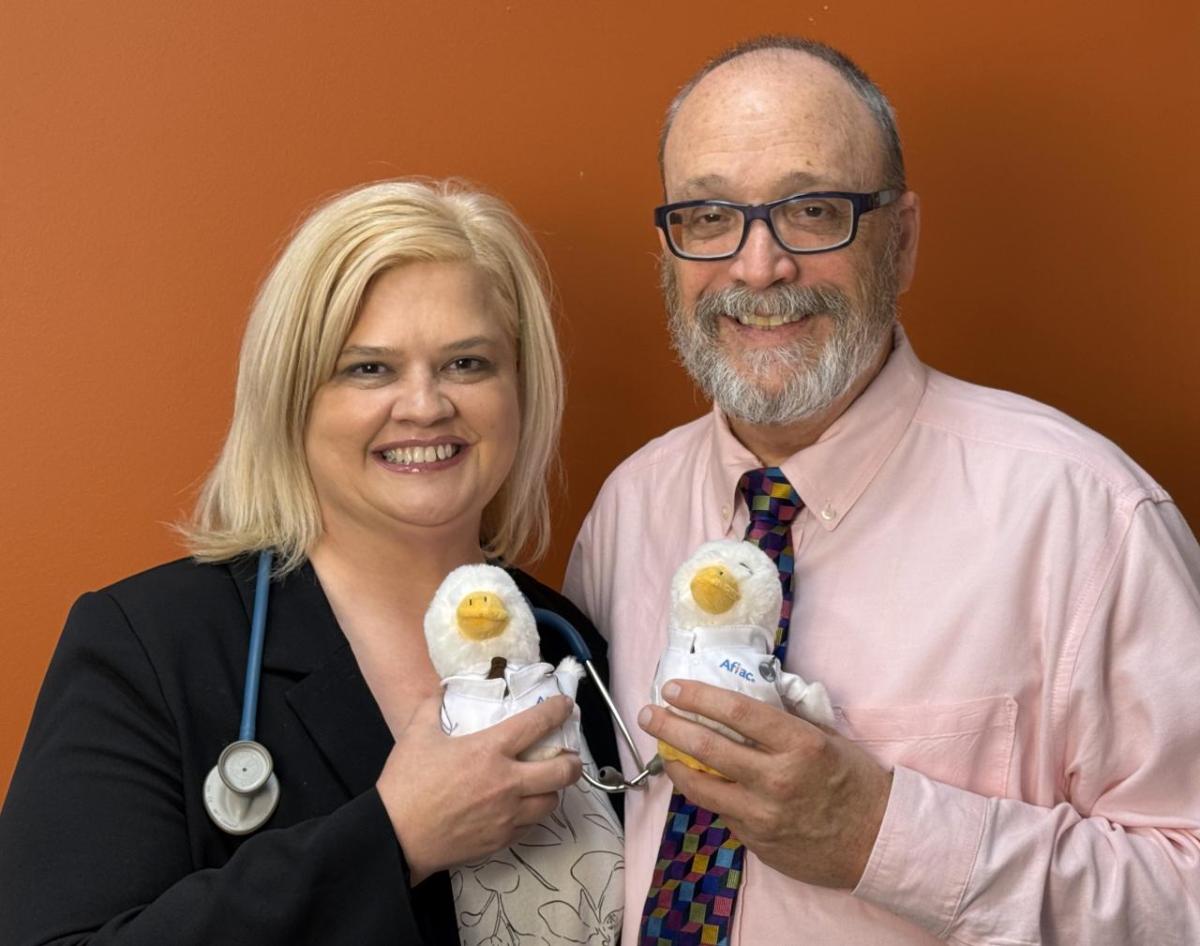Tom and Tricia’s Tips for Prioritizing Your Health

Originally published on Aflac Newsroom
This time of year often comes with to-do lists that seem like they are a mile long, with items like spring cleaning, gardening, planning for graduations, and prepping for the summer often at the top. But what about your wellness screenings — have you completed those yet?
If not, you’re not alone. In fact, 9 in 10 Americans admitted to putting off health checkups that could help save their lives, according to the 2025 Aflac Wellness Matters Survey.
Aflac’s Tom Morey, senior vice president and chief actuary in the U.S., and Tricia Griggs, RN-BSN and manager, employee wellness, recently sat down to talk about Tom’s personal health story and what he and Tricia recommend for keeping your wellness at top of mind.
What does “wellness” mean to you?
Tom: For me, the topic of wellness is deeply personal. In my early 20s, I went from being at the prime of my life — enjoying time on the basketball court and looking forward to grad school — to being in and out of hospitals, dealing with persistent flu-like symptoms and unexplained bruising. Out of the blue, it progressed to the point where I had my spleen removed. It seemed like it all happened so fast. But because I listened to that nagging feeling, I was able to get the care I needed. Wellness, to me, means listening to your body’s cues and taking action when you need to. And it means scheduling for your health even when you are feeling great. Until that one day, I was symptom-free.
Tricia: Tom’s story is a powerful reminder that even among the demands of daily life, maintaining our wellness is critical. And wellness is rarely just one component — we like to look at it as having five dimensions: In addition to physical, we also consider the emotional, financial, social and spiritual aspects of wellness.
What do you do to stay on top of your wellness?
Tom: Fortunately, my story took a positive turn: I recovered and have been able to pursue a career as an actuary, a numbers guy who relies heavily on statistics in my daily work. Looking at the findings from the 2025 Aflac Wellness Matters Survey, I see that I’m like the 65% of Americans who said that experiencing a health scare is what made them realize they need to be more proactive about their health — it’s certainly something that reinforced the importance of preventive care for me, and it’s something that I commit to each year.
Tricia: I couldn’t agree more! What I consider to be one of the best ways of preserving wellness is getting your preventive screenings, because of the way the human body is, you don’t always see or feel a potential problem. Going to your annual wellness exam, knowing your biometrics and staying on top of screenings like mammograms, colonoscopies, etc., are key elements of your health. Just as you may commit to a nutrition plan or exercise routine, you should also commit to getting regular checkups.
But I feel fine. Why do I need to see a doctor every year?
Tom: I get it. You feel healthy, or maybe you can’t find time to step away from your daily responsibilities, or perhaps you feel a bit embarrassed or afraid of bad news — again, it isn’t just you. According to our survey, 94% of Americans face similar barriers. But much like investing, the sooner you start, the more positive results you’ll see in the long run.
Tricia: I always tell family, friends and colleagues: Just go to the doctor. If you’re perfectly healthy, great — then you won’t have to go back until your next recommended screening. Plus, you’ll have a baseline for what your wellness looks like in this point in time.
Ok, but where do I start?
Tom: I would start with your primary care physician. A lot of Americans — nearly 1 in 5 — don’t have a regular physician who knows them and their medical history, and 41% of Americans use urgent care or the emergency room for their medical needs.1 If that’s you, it makes sense to me to find a physician in your area who you feel comfortable with and see them regularly. And, whether something concerning comes up or you simply want to find additional health resources, they’ll be able to give you relevant advice based on your health history.
Tricia: Emergency rooms and urgent care are important parts of the health care ecosystem, but nothing replaces a longstanding relationship with your physician. And if you’re having a difficult time finding one, check with your employer — some offer on-site clinics that can help employees get started on their wellness journey. The important thing is to just get conversations started and appointments on the calendar.
Want to learn more about findings from the 2025 Aflac Wellness Matters Survey? Visit Aflac.com/Wellness-Matters for tips to improve your health, access social media content and to read the full 2025 Wellness Matters Survey.
About the study: The 2025 Wellness Matters Survey was conducted among a nationally representative sample of 2,000 employed U.S. adults ages 18-65 in April 2024 by Kantar Profiles on behalf of Aflac.
The results from the 2025 Wellness Matters Survey are intended for informational purposes only. Aflac's family of insurers American Family Life Assurance Company of Columbus and/or American Family Life Assurance Company of New York, and/or Continental American Insurance Company (CAIC) and/or Continental American Life Insurance Company. WWHQ | 1932 Wynnton Road | Columbus, GA 31999
Z2500262 EXP 4/26

